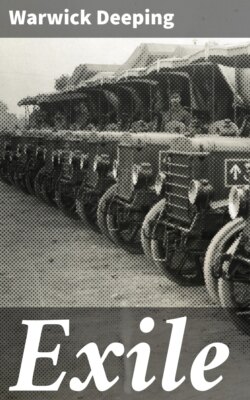Читать книгу Exile - Warwick Deeping - Страница 26
На сайте Литреса книга снята с продажи.
III
ОглавлениеTable of Contents
The Café Ceres came seldom to the English Library, and Frevick was one of the few who ever appeared in that literary tabernacle, and he came seldom and with an air of haste. He would bang the old book down upon the table, and grabbing a new one rather at hazard, go and hold the book so that the recording angel could write down the title. He was never conversational; he came and went as quickly as possible.
On one occasion when Billy had been entering up the book he had selected she had felt moved to glance suddenly up at him, and she had found Frevick’s eyes fixed upon her face with a kind of hunger and of helplessness. He had looked confused, discovered.
But Frevick was incorrigible about books. He would keep a book a month, and sometimes the copy when it was returned, was scribbled over. Little savage protests had been pencilled on the margins. “Bosh.”—“Life’s not like that.”—“Succulent slush.”—“O, go and boil it harder.” Billy had shown one such copy to Julia Lord, and Miss Lord, instead of displaying indignation, had spoken gently. “Oh, it’s just Mr. Frevick. Rub it out.” And Billy had taken a piece of indiarubber and erased Frevick’s scribblings.
Then came an occasion when the artist had held up for three weeks a copy of a particular novel, and the novel was in clamorous demand, and Billy, not wishing to trouble Miss Lord, supposed that a personal collecting of the book was the obvious and most expeditious remedy. She looked up Frevick’s address. He lived now in a house in the Vicolo Venito.
Billy sought out the Vicolo Venito, and found Frevick’s house, a little, dilapidated pink box set at the end of a strip of untidy garden. It was Tindaro of the Tindarese. A few iris clumps raised green blades above a stretch of dirt. The path was a mere track. The door was almost innocent of paint, though it belonged to the house of a painter; and perhaps because of it. Some washing had been hung out to dry on the bare branches of a fig tree. Billy saw a pair of faded pink pants. There was something pathetic and squalid about those pants.
A rusty chain hung down beside the door. Billy pulled the chain and a bell rang. She waited; nothing happened. She pulled the chain a little more vigorously, and a dog barked.
As she stood looking at the washing on the fig tree the door opened on her suddenly and she turned to find Frevick in his socks, coatless and collarless. His chin was all stubble, his eyelids red. A little yellow mongrel dog with very bright eyes stood with him, and looked up at Billy and wagged a feathery tail.
“What d’you want?”
His sodden abrupt fierceness shocked her. He stood in the doorway as though hiding a secret. The dog sat down, and leaning against his leg, allowed a pink tongue to hang.
Said Billy, somehow feeling that, she surprised an animal in the midst of tearing its food—“So sorry to disturb you, but that book, ‘Galleons Reach.’ So many people are asking for it.”
He looked fuddled, bothered.
“Haven’t got it, have I?”
“You have had it nearly a month.”
She smiled at him, and suddenly the expression of his face changed. His eyes became like the eyes of a sick dog, gentle, helpless.
“Damned silly of me. I’ll look it up. Sorry you’ve had the trouble.”
He went to find the book, and the dog went with him like a little sedulous, faithful spirit. Billy saw the red tiles of the passage, and an old overcoat hanging up rather like the figure of a man who had hanged himself. When Frevick reappeared she noticed that he had wound an old silver and blue scarf round his neck, and that his hair had been brushed. The dog waited beside feet that had been thrust into slippers.
“Sorry to keep you. Here it is. Great book. I’ll try and be more punctual in future.”
She smiled at him and took the book, and bent down to pat the dog.
“I hope you finished the book?”
“Read it twice. There’s a man in that book who could take his medicine. Sorry you’ve had the trouble.”
“O, that’s all right.”
She smiled at him again, and he watched her go down the path, but she did not look back, but opened and shut the rusty gate, and then it was that he noticed the washing hanging on the fig tree. His eyes were both consenting and reproachful. What did it matter? What did anything matter? The dog, getting on her hind legs, was pressing her forepaws against his knee; she gave three little appealing barks, and he bent down and lifted her up, and shutting the door with the toe of a slipper, returned to that frowzy place he called his studio. He sat down in an armchair, with the dog on his knees. Yes, life was pretty hopeless, but something young and gallant had knocked at his door.
